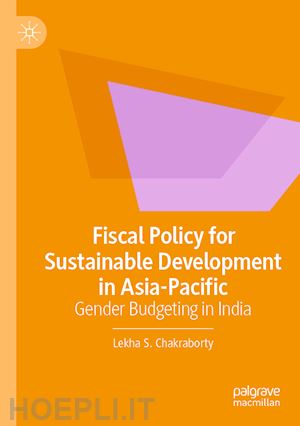
Questo prodotto usufruisce delle SPEDIZIONI GRATIS
selezionando l'opzione Corriere Veloce in fase di ordine.
Pagabile anche con Carta della cultura giovani e del merito, 18App Bonus Cultura e Carta del Docente
This book examines how macro-fiscal policy can lead to gender-aware human development in an emerging economy like India, with special reference to gender budgeting. Integrating gender lens in macro-fiscal policies has been widely recognized in international and national policy making and budgeting. The book highlights the gender diagnosis—the measurement issues relate to construction of gender outcome variables; the statistical invisibility of unpaid care economy sector and how deficiency in public infrastructure can accentuate the private costs; the analytical link between gender outcome variables and macro-fiscal policy frameworks; the role and impact of fiscal transfers on gender equality outcomes at subnational levels; time series of gender budgets in India across sectors and its fiscal marksmanship; gender disaggregated public expenditure benefit incidence analysis to understand the distributional impacts of public spending on women across income quintiles and suggest policy alternatives. The book uses unique database—time use survey data and the disaggregated demand for grants, expenditure budgets using gender lens. The book employs case study, simple statistical tools for the analysis and econometric methodology.
Introduction.- Macroeconomic Policy Coherence and Gender Equality in Asia Pacific.- Measuring Gender Inequality.- Measuring Unpaid Care Economy.- Fiscal Policy and Gender Inequality in Asia Pacific.- Determining Gender Equality in Fiscal Federalism.- Political Economy of Gender Budgeting: Fiscal Marksmanship.- Public Expenditure Benefit Incidence.- Gender Budgeting in PFM: Evidence from Asia Pacific.- Conclusion.
Dr. Lekha S. Chakraborty is Professor at National Institute of Public Finance and Policy, India. She is elected as Member of Governing Board of Management of International Institute of Public Finance ( IIPF), Munich. She is also affiliated as Research Associate with the Levy Economics Institute of Bard College, New York, USA. She is the pioneer economist who has worked for institutionalizing gender budgeting in India, working with the Chief Economic Advisor, Ministry of Finance, Government of India, in 2004. She is the author of Fiscal Consolidation, Budget deficits and Macroeconomy (2016) and co-author of the book Social Sector in Decentralised Economy: India in the Era of Globalisation (2016). Her work experience on macro-fiscal policy and human development spans across Asia Pacific, and some specific countries include Sweden, Canada, Morocco, the Philippines, South Africa, Sri Lanka, and Mexico.











Il sito utilizza cookie ed altri strumenti di tracciamento che raccolgono informazioni dal dispositivo dell’utente. Oltre ai cookie tecnici ed analitici aggregati, strettamente necessari per il funzionamento di questo sito web, previo consenso dell’utente possono essere installati cookie di profilazione e marketing e cookie dei social media. Cliccando su “Accetto tutti i cookie” saranno attivate tutte le categorie di cookie. Per accettare solo deterninate categorie di cookie, cliccare invece su “Impostazioni cookie”. Chiudendo il banner o continuando a navigare saranno installati solo cookie tecnici. Per maggiori dettagli, consultare la Cookie Policy.